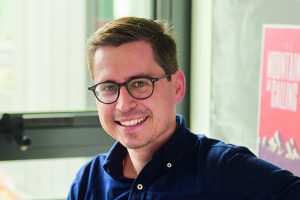
Prof. David Egger
At only 32 years, David Egger has quite an impressive scientific career with stages at TU Graz, the Weizmann Institute in Israel and the University of Regensburg. Since June 2019 the physicist is professor for “Theory of Functional Energy Materials” at TU München and member of e-conversion. We asked him about his research, why he loves being a scientist and what are his wishes and ideas concerning the cluster.
“Theory of Functional Materials” – What does that mean?
We use supercomputers to understand physical effects in functional materials microscopically and predict new compounds of interest to our partners from experimental and synthesis labs. The focus is on the theory of energy materials, where electronic-structure and molecular-dynamics techniques are used and further improved. Our aim is to describe novel materials that can be employed in efficient energy devices. In this quest, the development of theoretical methods and implementation into computer code is one of our areas of expertise.
How is your theoretical work connected to practical research?
Our motivation are theoretical proposals of novel materials that can be used directly in practical applications. These include highly efficient solar cells, nanoscale molecular devices and batteries. To this end, we study a wide range of compounds that include hybrid molecule-metal interfaces, halide perovskites, organic semiconductors, ion conductors, photocatalytic molecules and more, all of which have massive potential for technological applications in energy conversion or storage. At the moment, our main experimental partners are groups from the Weizmann Institute of Science in Israel, the Imperial College London and the National University of Singapore.
What have been formative experiences that convinced you to study physics?
I was very fortunate to have an excellent physics teacher. He showed us how much physics can help to understand some of the things that surround us, which motivated me to study it.
If not physics what would you have liked to study / learn?
Philosophy, for the same reasons: similar to physics, but often in a different way, it is a wonderful subject for those who like to make sense of “what it all means”.
And later on: What convinced you to stay in science?
It is a dream job for me: to constantly learn new things, while being able to work in an environment of creative, smart, and kind people – it is just great fun! I think it is also a wonderful opportunity to work with young people my whole life, supporting them in reaching their goals as best as I can.
What are the moments when you “feel the flow” and you know “Yeah, I love being a scientist!”?
There are many, especially with leading a group it is always very motivating to see that a student’s project is going well or that something that didn’t work for a while finally does. But I would say the “best” moments for me personally are those when something that didn’t make sense for a while suddenly does, when the pieces of the puzzle finally fit together. It means that I have learned something!
What do you wish for being a member of e-conversion?
Do you have any specific ideas what the cluster could offer beyond the existing features?
For us, being physicists working on the theory of materials, I think the most important aspect about e-conversion will be collaborations with experimental and synthesis groups via the cluster. I believe that there lies a true potential in close experimental-theory collaborations, namely when the two not only complement each other, but really interlock to reach the next level in discovering new things. I cannot say much about how to go beyond existing features of e-conversion, because we have just joined the cluster. But from my time at the Weizmann Institute of Science in Rehovot, Israel, I do believe that it will be important for us to meet and talk, often informally, as much as possible. Discussing questions that may appear “naïve” in an open and constructive way from multiple perspectives, addressing things that really puzzle us, could be very useful. Maybe we can define big open questions in this way, or find synergies and commonalities among different fields of the cluster?
Has there already been anything that was made possible by e-conversion?
Absolutely yes: It immediately enabled me to meet colleagues of the cluster, for example in internal meetings at the ZNN. Furthermore, e-conversion has organized a conference in the beautiful city of Venice, which I experienced as really inspiring and motivating.
Thank you very much for this interview and good luck with all your research!
